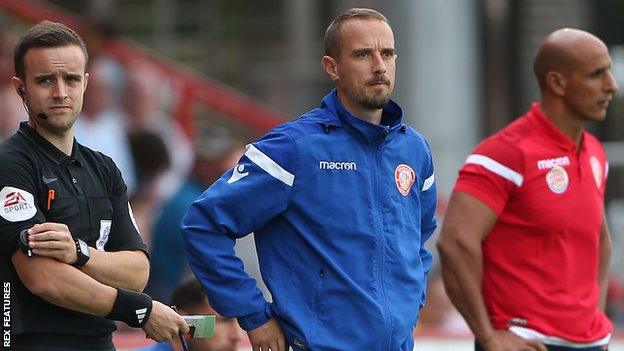Stevenage say Mark Sampson has no case to answer over racist language allegation
- Published

Mark Sampson (middle) was recruited by Stevenage as first-team coach in July
Stevenage say allegations that caretaker manager Mark Sampson used racially discriminatory language "have no foundation".
The League Two club say they reached their conclusion after an internal investigation.
The Football Association is investigating the complaint against former England women's boss Sampson.
It plans to speak to all parties involved to determine the facts before deciding what action to take.
"We are aware of the allegations and we are investigating the matter," said an FA spokesperson.
Sampson took over as caretaker manager at Stevenage following the sacking of Dino Maamria this week.
A statement from the club, external said the allegations "were phoned in to the FA by a former coach the day after he was told by Sampson that he no longer required his services at the club".
"The claimant was offered the chance to make a formal complaint but declined this opportunity, instead choosing to call the FA," said Stevenage chairman Phil Wallace.
"Nevertheless, CEO Alex Tunbridge acted immediately to interview and take statements from two individuals the claimant said were witnesses, as well as others that were present in the same meeting, but not mentioned by the claimant.
"In each case the witnesses did not support the allegations. Given that overwhelming outcome and the circumstances of the allegation, the club concluded there was no case to answer."
Sampson was sacked as England women's manager in 2017 for "inappropriate and unacceptable" behaviour with female players in a previous role.
Before his dismissal, Sampson had that year been cleared of wrongdoing following discrimination allegations made by England players, including striker Eniola Aluko.
The handling of both cases was subject to a Digital, Culture, Media and Sport Select Committee hearing in October 2017.
The FA then apologised to Aluko and England team-mate Drew Spence for Sampson's racially discriminatory remarks after an independent barrister ruled he made unacceptable "ill-judged attempts at humour" on two occasions.
Sampson later said he "apologises to Drew and Eni unreservedly" and regretted not playing a "much more active role" to ensure their complaints "were handled more respectfully".